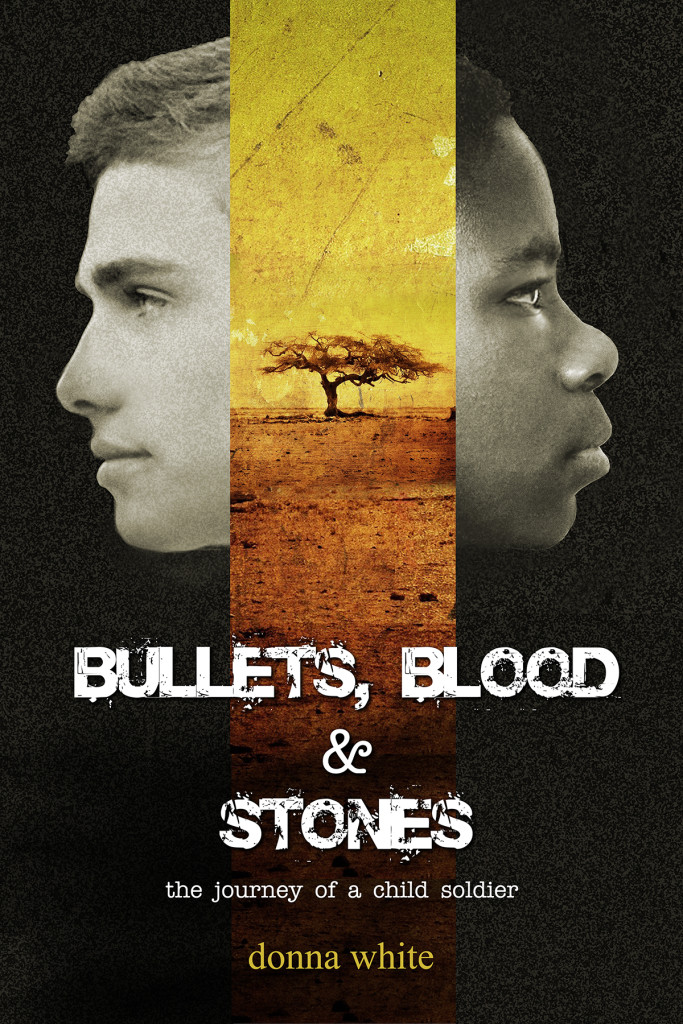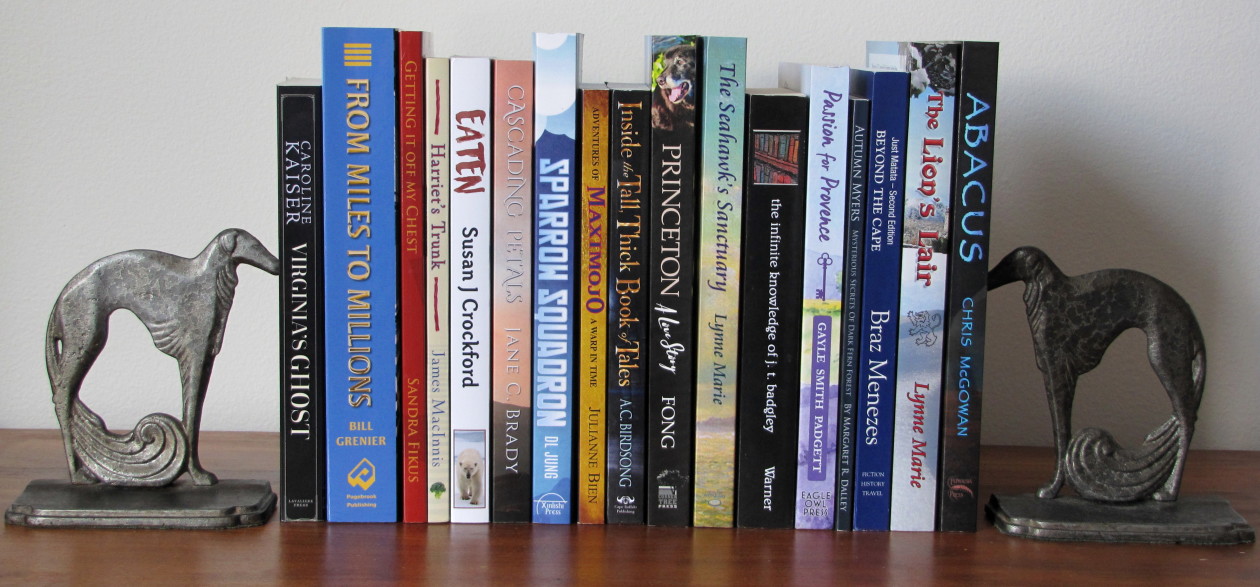The new year has already brought me a much-needed change in residence, and with it, a steady improvement in my health and a renewed desire to get back to work on my editing and writing projects, including blogging. In the coming months, I’ll be writing more about editing and self-publishing, as well as featuring author interviews.

I introduce you now to author Donna White, whose novel Bullets, Blood and Stones: The Journey of a Child Soldier, vividly calls attention to the plight of child soldiers. To give you a little background, starting in 1987, rebel leader Joseph Kony displaced well over two million Ugandans from their villages and kidnapped, mutilated, and murdered tens of thousands of people. Among the victims were some sixty thousand children, who were recruited by Kony for his Lord’s Resistance Army (LRA) to fight against the Ugandan government. Some of these children were as young as seven, and they were given no choice but to fight–it was kill or be killed. Kony’s reign of terror continued for about two decades. He was indicted for war crimes and crimes against humanity in 2005, but has managed to evade capture.
Recently, I spoke to Donna about Bullets, Blood and Stones.
CK: I know that you visited Uganda a few years ago. Can you tell me what took you there in the first place? Was the idea for a book about child soldiers already forming in your mind at the time, or was there some other reason for going?
DW: Yes, the idea for the novel was already brewing in my mind before I headed to Uganda in 2008. I had a general feel for the storyline, but I knew I had to go to Uganda and see these children and take in everything, the culture, the food, the land, and the people, for my book to have any substance. But it wasn’t until I met Charlie and heard his story that I knew what the true essence of the book would be.
After I wrote book one, I knew the story couldn’t end there so I travelled to Uganda again in 2015, this time focusing on the rehabilitation process of former child soldiers and taking in a safari so I could incorporate more of Uganda’s natural habitat into the book.
CK: As part of your research for Bullets, Blood and Stones, you actually spoke to former child soldiers. What was hearing their stories like for you?
DW: Before I went to Uganda I tried to mentally prepare myself for these interviews. I knew the stories would be difficult to hear so I read and watched interviews online just to get an idea of what I was going to come upon. It was still difficult. There were times I had to stop and just sob in the middle of an interview. I couldn’t fathom the horror that occurred in these people’s lives. I didn’t want to. I have some stories written in my journal that are too awful to repeat. I haven’t shared them with anyone. I don’t know if I ever will.
CK: Would you say that Uganda is truly recovering from two decades of devastation wreaked by Kony? What signs of recovery have you seen?
DW: Oh, yes. Northern Uganda has been recovering since Kony left. The people are back to their land and have rebuilt their schools and houses. During my first visit I witnessed World Vision providing people with seedlings and livestock to help them get back on their feet again. It was lovely to see. On a whole, I think the former child soldiers are doing better. But it is a day-by-day sort of thing. It takes time. They suffer from PTSD (Post-Traumatic Stress Disorder) and must deal with the stigma that is attached to them. Some people still don’t trust them, and some families and communities have banned them from returning to their villages. So yes, there is change, but it will take time.
CK: The novel is intended for young adult readers, and I feel you’ve succeeded in making a difficult topic appealing to that age group–not an easy task. Can you tell me what qualities your book has that will entice young people to read it?
DW: I’ve had young adult readers tell me that the book is really fast paced and is a real page-turner. So much that they’ve stayed up late into the night wanting to finish it. Even teachers have told me their classes groan when they’re told they have to stop at a certain chapter before they can continue on the next day. But I’ve also heard kids tell me that they love the “emotional roller coaster” it takes them on. One moment they’re sad, the next they’re laughing, and the next they’re shaking their fists. I like to hear that. Others have said they feel like they’re right in Uganda during the story because the imagery is so intense. And others have said they like it because “it’s real”. The violence is real. It really happened and they appreciate a story that tells it as it is and doesn’t sugar-coat it.
CK: What do you hope readers will ultimately take away from this book?
DW: I hope they’ll take away a number of things. One, of course, is a stronger social conscience. To challenge the way they view themselves and their place in society. To look beyond their borders and see what is going on in the world. But I hope it doesn’t end there. An understanding of world events doesn’t bring about change. Only a desire and a passion to make the world a better place does. I hope that after readers close the book they set out to instill peace in their own lives and to help others who because of war, prejudice, or other circumstances desperately need it.
CK: What can Canadians do to help child soldiers around the world?
DW: Tough question, because in cases like this we can feel quite helpless. But we can make a difference by supporting programs with humanitarian organizations that are successful in bringing children, families, and communities out of poverty. When people are poor they will do desperate things, like selling their children to rebel groups, just to put much needed food into their bellies.
Another thing we can do is support an organization that helps with the restoration and reintegration of child soldiers. During my stay in Uganda, I saw many wonderful things happening with these young boys and girls who had escaped from the LRA. Through the rehabilitation programs thousands of children were given medical attention and counselling, and reunited with their families and reintegrated into their communities. This was all done through the hard work of World Vision workers and volunteers, whose commitment to helping these children was phenomenal. World Vision also works in countries such as Democratic Republic of Congo and Sudan to help these exploited children.
CK: I understand that Bullets, Blood and Stones is the first in a trilogy. What can you tell us at this stage about book two?
DW: Ah, book two! After I wrote Bullets and I returned to Uganda, I realized that Charlie’s story hadn’t ended yet. Although his body was free from Kony and the Lord’s Resistance Army, his mind was not. All of the children who escape from the horrors of being a child soldier suffer from Post-Traumatic Stress Disorder. In Uganda the Acholi people call it ajiji. And that’s what book two is about –Charlie’s ajiji and his attempts to free his mind from the flashbacks that come to him during the day and the nightmares that shake him awake at night. I also introduce the reader to another facet of child soldiers: the use of girls as soldiers and sex slaves in the LRA. It’s another intense read.
***
Donna’s stories may be intense, but they’re laced with hope as well. Her novel, Blood, Bullets and Stones: The Journey of a Child Soldier, is available on Amazon.ca.

 Follow
Follow